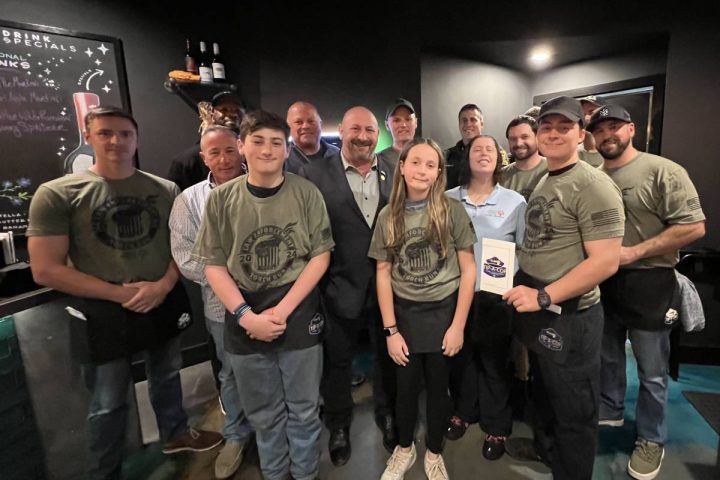Robert Markowitz says his family was not very supportive when he decided to leave his career as a criminal defense attorney to pursue another as a professional “party clown”. After nearly a decade of going through law school and working in the legal industry to practice law himself, Markowitz left it all.
After a brief stint of being a clown, he changed course once again to become a children’s musician — and now he’s an author.
Markowitz took this personal and professional journey and translated it into his debut novel, “Clown Shoes”, fictionalizing and creating a narrative using his life experiences. Then on July 11, Markowitz visited Monroe’s Edith Wheeler Memorial Library to give a presentation, teaching others how to create fiction from their own lives.

He outlined four key principles he discovered while writing his book, which he also found in similar pieces of literature. Namely, he used Ernest Hemingway’s “The Sun Also Rises”, to give examples of how these principles are used to fictionalize real life.
The first of the four principles was to find the deeper meaning in the life experience you choose to fictionalize. This can also be thought of as a theme of the story you are trying to tell. For Markowitz, this was the idea that when faced with unhappiness, a change is required, but it cannot just be external, it needs to come from the inside as well.
“Does an outer change like that really create happiness? I think that question is explored back and forth in the book,” He said. “Can an outer change, can an outer thing, really create inner change? And I think the answer turns out to be that it can be a beginning. But the inner change really has to come from within.”
For “The Sun Also Rises”, Markowitz discussed the trip Hemingway took to Pamplona, Spain, which the book is based on. The real trip taken by Hemingway and friends involved heavy drinking, fighting, love affairs, and other generally unsavory behavior by Hemingway and his associates.
Hemingway analyzed these events in order to write “The Sun Also Rises”.
The behavior of Hemingway and his contemporaries were tied to the mental scars left from the First World War,” according to Markowitz. The war deeply affected all, leaving many in the generation feeling lost and without purpose. Hemingway took these events from his trip to Spain and was able to craft a commentary about the disastrous effects of the war on that generation.
Raising the stakes
The second insight Markowitz talked about was to raise the stakes for the plot. Markowitz explains this in simpler terms: “Make the story bigger!”
This was done in “Clown Shoes” by changing the motivations driving the main character. In reality, Markowitz left the legal professions because it simply did not fulfill him.
Will Ross, the protagonist and Markowitz’s “alter-ego” for the book, has a much more tragic motivation. He suffers from crippling guilt after helping acquit a child molestor, which led to the client killing a child.
Although both of them followed a similar journey, the fictional motivation given in the book is much more extreme, which builds a more captivating narrative and also sets the stage for a redemption arc, Markowitz’ explained.
A ‘bad guy’
The third insight Markowitz explored was to identify or create a human antagonist. A larger plot benefits from having a “bad guy” who acts as a foil to the main character. They push the character to change and overcome the challenges created by the antagonist.
“Every story benefits by having a human antagonist. They really do! Somebody who impedes the progress of the protagonist,” Markowitz said. “It makes the story gripping.”
Going back to “The Sun Also Rises”, Hemingway did this by exaggerating and embellishing the characteristics of one of the men he went to Spain with. Harold Loeb, a friend of Hemingway at the time, became Robert Cohn in the book.
A larger plot benefits from having a “bad guy” who acts as a foil to the main character. They push the character to change and overcome the challenges created by the antagonist.
Both Hemingway and Loeb competed to gain the affection of a woman during their trip to Spain, but in the novel, Cohn is characterized as a hapless loser who is completely unable to win the attraction of the woman he pursues. Hemingway also writes Cohn to be violent and, all around, not a very good person.
This serves the story as Cohn becomes that human antagonist to the protagonist of the book, who represents Hemingway. Hemingway took aspects of Loeb and altered them to make the plot of the book more engaging, according to Markowitz.
The human piece of the human antagonist is very important, Markowitz said, recalling words of advice from literary agent Cecilia Lyra on the matter.
“She says you cannot substitute a social barrier,” he explained. “For instance, you can’t substitute a human antagonist for the glass ceiling or prejudice. It doesn’t work. It doesn’t keep the reader’s interest. It’s got to be a person.”
Tighten the timeline
 The final principle is the concept of condensing the timeline. When translating real life events into great fiction, the time frame of events should be kept tight, Markowitz said.
The final principle is the concept of condensing the timeline. When translating real life events into great fiction, the time frame of events should be kept tight, Markowitz said.
In reality, personal journeys are usually gradual. But these slow changes do not translate well into fiction. Instead, if a writer squishes the timeline, moving key events closer together, a more dramatic story is created, he said.
Markowitz’s journey, from the doubts he had as he practiced law to leaving his work and eventually succeeding as a children’s musician, took around 10 years. But the entirety of the book takes place over the course of only one year. This cuts out any unnecessary time and creates a tighter story overall.
After the extensive explanation Markowitz gave of these four insights, he opened up about a final important factor that is, in his opinion, needed for great storytelling.
Markowitz said the four insights are “not quite enough to create compelling fiction. The key ingredient that I think needs to be there is an impactful relationship that pervades the story.”
By impactful, Markowitz meant the relationship needs to promote growth in both of the characters. Similarly to the human antagonist, the relationship should inspire the main character and push them to grow. And the relationship should ideally work both ways. Both characters should instigate personal change in each other.
“It doesn’t have to be a romantic relationship,” Markowitz clarified. “It absolutely can be a mentor relationship or a non-romantic relationship. I think as long as the people are deeply affecting each other’s lives.”
“Clown Shoes” was published last month, on June 20. Even after the heavy alterations required to take a part of his life and turn it into an engaging piece of fiction, Markowitz said he can still see a large part of his own journey within “Clown Shoes”.
Markowitz said, “the story is heavily fictionalized, but the core of it, the emotions, and the theme come from my life.”
Clown Shoes is available for purchase on Amazon.
All respectful comments with the commenter’s first and last name are welcome.






